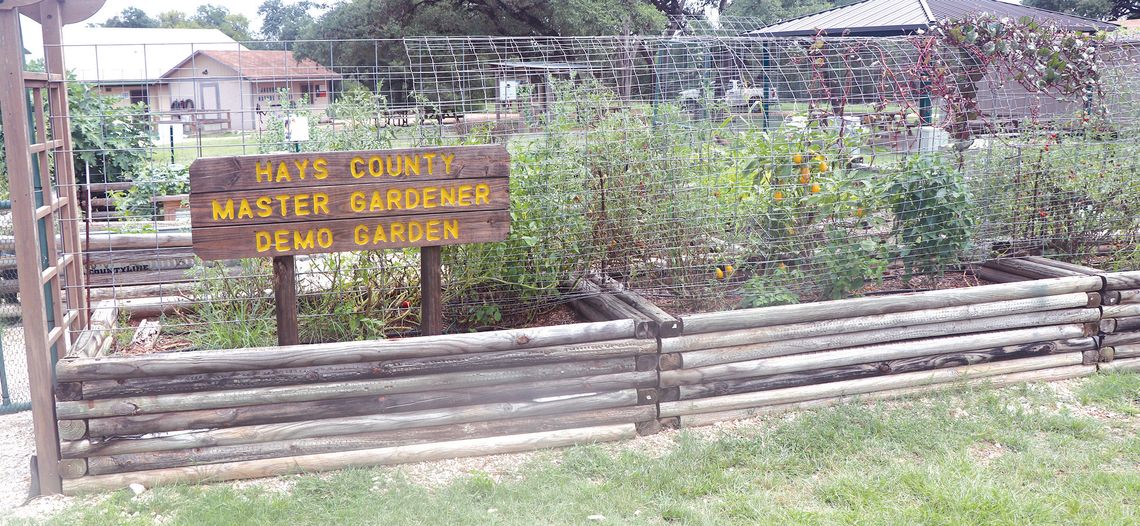As the climate shifts worldwide and more people move into the Hill Country, locals and newcomers alike have taken an interest in plants.
Whether the goal is to grow a more bountiful vegetable garden or to become a better steward of water resources, the Hays County Master Gardeners offer a comprehensive training course to teach local growers how to better maintain their land and gardens within the greater scope of the Hill Country.
“In this day and age — especially with the extra heat, and the lack of water, and the fact that so many people move here — we really need people to learn how to grow responsibly, how not to use too much water and just to be responsible, successful gardeners,” Marilyn Love, training and membership committee chair for HCMGA, said.
Held once a year, the Hays County Master Gardeners training class aims to provide information on best-practices gardening for this area. Taught by Texas A&M AgriLife Extension Service specialists and local experts, the master gardeners program offers 64 hours of instruction following Earthkind practices of landscape management covering soil and plant nutrition; insect, disease and weed management; trees; vegetable and herb gardening; lawn care; plant selection; composting; and water conservation.
“With this class, people will learn about growing from seed, propagating — everybody loves propagating — botany, learning what good soil is and learning how to build good soil,” Love said. “Our main mission is to be disseminators of scientific, research-based horticultural information.”
In addition to the research- driven coursework required by the Texas A&M AgriLife Extension, the Hays County Master Gardeners include classes tailored to high-interest topics for this region, including the Three T’s of Central Texas Gardening: Turf, Trees and Tomatoes.
“A lot of the things are basic and required, but then there’s a little extra room to throw in things that are of high-gardening interest,” Love explained. “This time, we have one class that’s totally dedicated to tomatoes, because that’s something we get a lot of questions about. Tomatoes are universal. Tomatoes are the most common vegetable that people grow by far.”
Another mini-session will focus on how to install a drip-irrigation system. “This is going to be a hands-on [class] where they actually get to put one together out at Jacob’s Well,” Love said.
The Master Gardeners course is ideal for anyone who wants to be more successful gardeners and who have the time to volunteer once the course is completed. “We are a volunteer organization,” Love said. “That’s when you actually do a lot of learning. So someone who has the time and the inclination to volunteer and give back to the community.”
After finishing the coursework, participants complete 50 hours of volunteer service through the county extension office within Hays County to complete their certification.
“We have lots of projects around the county,” Love said. “Our county’s so spread out. You’ve got people who live in Dripping Springs, and then you’ve got people who live in San Marcos, Buda, Kyle, Wimberley and Driftwood.”
Additionally, new arrivals to the Hill Country will benefit from this class because it gives a comprehensive introduction to the native plants that thrive in this region.
“I’ve done some gardening all my life, but I was in different places,” Love said. “I moved here, and I thought, ‘I don’t have a clue what to plant,’ and it makes a big difference.”
Utilizing native plants is one of the key components to Earthkind Land Management Practices.
“We highlight the importance of using natives, because we have a lot of people who moved to San Marcos from Houston, for example,” Love said. “Might as well do natives: They like the dirt. You don’t have to fertilize. They’re used to not having a lot of water. There are a lot of plants that are native to the Edwards Plateau that thrive here.”
Beyond the extrinsic rewards of being better stewards of natural resources and maintaining a more successful garden, recent studies also show that there are internal rewards to gardening as well.
“Being outside and growing things is so good for your mental health,” Love said. “To be successful so that you’re growing things that you know are good for the ecosystem, and also good for you. Once you learn this stuff, your neighbors will ask you, your relatives will ask, and you can be confident that you’re giving information that’s based on research. It’s a community.”
This year’s training course will run from Sept. 6 to Nov. 15, with six in-person classes on Fridays from 8:30 a.m. to 3:30 p.m. and six classes held via Zoom. Tuition for the course is $250, which includes the textbook and various gardening supplies. The application deadline is Aug. 23; visit hayscountymastergardeners. org to apply.







